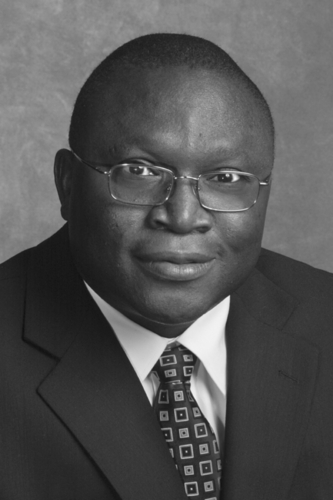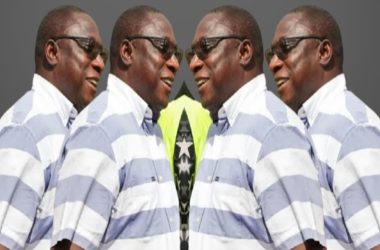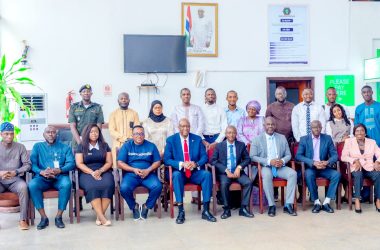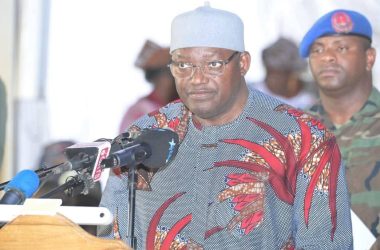
(JollofNews) – Barrow and Yahya Governments are essentially the same! By this I don’t mean the extra judicial component of APRC government. In fact they are both the same as Jawara’s. That means we haven’t learned anything (or very little) from our own history.
Its even very suspicious Finance Ministers are using an existing temple on which they simply plug in their numbers, probably with few twigs to the text. The general layout and language is essentially carbon copy year after year. That only encourages no imagination on the part of those involve in the preparation.
The Coalition 2016 finally presented an Appropriation Bill called 2017 Revised Appropriation Bill (Revised 2017 Budget) to The National Assembly Thursday June 29 2017. One wonders on the bases of what law were they spending our money over the past 6 months. This is legal except we disagree so much with Yahya’s I don’t think we could harmoniously spend on his plan for 6 months long. Apparently that’s what we did. Maybe we didn’t disagree with Yahya on policies/laws but in person.
Hereunder a tabular comparison! All blank spots means the numbers aren’t available.
 Specific Observations on The Numbers:
Specific Observations on The Numbers:
Many variables were not presented and /or broken down into the components for public consumption. For instance we know the total revised revenue but no information on how much is taxes and non-taxes
Under the December 2016 Appropriation Bill cost of government accounts for 75% of our own portion of the revenue. Mr. Sanneh’s failure to provide details makes comparison here impossible. However the personnel costs (see table) are exact same numbers (D2.68b). If that proves true for the other concern variables here the proportion of costs of government under the revised budget will be more than 75% of our local revenue.
Regardless, that number is more or less than 75%, this is our FUNDAMENTAL PROBLEM TO BOTH FREEDOM AND PROSPERITY. In simple term government is so big it eats up D0.75b of every dalasi Gambia produce. The flip side of that is impoverishment of the taxpayers. On the other hand the bigger the government; the less space for our freedoms and civil liberties! Mr. Sanneh and his government have NO ANSWER for this problem either with the numbers and/or programming.
Couldn’t find the figure on our NATIONAL DEBT. It’s reported by Mr. Sanneh to have ballooned to 120% of our GDP by 2016. That’s probably about the same figure mid-2017. What this means is lay-man term is having (or your pay is D10) but you owe a friend or someone D12. Our debt is 20% more than our production. We are drowning and this will further impoverish our nation. Sadly Mr. Sanneh talking about his government’s desire for macroeconomic stability but no specific strategies and/or plan of action how that will be achieve. In fact Mr. Sanneh’s budget has D995million deficit spending. Although significantly lower to the almost D5b deficit spending under Yahya’s budget – both still increases the already astronomical huge national debt
2016 Appropriation Bill reported D3.7b earmarked for servicing the interest on our debt. That means only paying our creditors interests accrued on what we owe and deal with the principal at a later date. In fact to pay back D3.7b we will have to borrow and/or close down certain government function. Both the 2017 and Revised 2017 Appropriation Bills didn’t afford us information of what the due interest for the year under review will be. Because there was an additional deficit spending in 2016 we can safely assume the interest due in 2017 can only be equal or more than that of the previous year. I simply plug in the 2016 figure in the table (keeping it constant), if for nothing it will enable us to illustrate the points. That has put us in RED over D600m. That means we either DEFAULT ON THE INTEREST and/or WE BORROW more money. The former unacceptable in the credit market and the later compounding poverty. How do we get out of this poverty cycle – Yahya never has an answer and Barrow and Mr. Sanneh are following the same path.
The figures for Total Expenditure and Net Lending, D19.1b and D13.198 for 2017 and Revised 2017 Bills respectively are political numbers rather than economic. We do not have that money. What we expect to have is reported under revenue. However, politicians (in this case the executive) we want to spend this much for reason X, Y and Z. What they are doing is that we will go and borrow. Yahya (2017 Bill) will borrow D5b to cover the deficit spending while Barrow (Revised 2017 Bill) will borrow about D1b.

Notice the significant variation in projected grants. This begs the question how do they capture this number. Is it based on the yearly projected allocation of existing projects? It’s verbal promises made at corridors of meetings? Or is it wishes of the planners? From Mr. Sanneh’s presentation it appears the former is the case. Because he blamed the significant reduction on those projects winding down. However if this reasoning is true; planners should know that fact at times of planning. There are acceptable accounting recognition of grant – we will be better serve if planners follow those good practices.
General Observations:
By the name (2017 Revised Budget) one would reason changes are made to the Appropriation Bill 2017 presented to and approved by National Assembly by Yahya Jammeh administration on December 26, 2016. However, Amadou Sanneh, an accountant by professional and current Minister of Finance made all his comparisons to 2016 budget rather than the budget he’s revising. Mr. Sanneh is also very loose and scanty on details – reference the table of all the blank spots.
With the national debt he uses word like burgeoning debt! Go look at the dictionary meaning of that word and tell us if 120% debt to GDP is anything but burgeoning. A while ago Mai Fatty, Minister of Interior addressed our political and socio-economic problems as TEETHING rather than CHRONIC. Is this a conscious effort to downplay every problem because you’re now the government? You make that call!
Mr. Amadou Sanneh generally blamed the variations on the political impasse that causes shocks to our economic drivers such as agriculture, tourism, etc. Although hard to see how agricultural production was impacted but I think as general matter tourism was affected. We don’t know the exact impact of the shock! That’s sad! That’s quantifiable and we should. Furthermore, The Minister blamed higher fuel costs and embezzlements. Sadly the numbers do not reflect how fuel consumption will be reduce besides good old advice – we will encourage fiscal discipline. How did that work the past 52 years? On the issue of embezzlement how did he know? Were there internal and/or external audits or even some commissioned Commission of Enquiry (ies)? At minimum we need to know. What has the government done with the embezzlers, if in fact he settled on embezzlement? Nothing we know off so far.
Selling the presidential fleet of planes or Yahya’s planes left open a legal question of who owned the planes. The 2 are fundamentally different. If in fact the said planes are owned by the nation of Gambia – our government can dispose them as wish. If on the other hand the said planes are on Yahya’s name and/or some interests of his – our government can’t directly sell them. If our government believes those assets including the said 44 pick-ups were inappropriately acquired – put your evidences through APPROPRIATE LEGAL INSTRUMENTS. We fought for LIMITED GOVERNMENT – meaning your only powers are those afforded by law. You have no power to arbitrarily seize private property. Under our laws only the appropriate court has authority to make such determination/declaration based on law. This principle stand is not defense of Yahya but the constitutional rights of every one in The Gambia. Innocent until proven guilty at a court of law!
Mr. Amadou Sanneh also broke basic budgeting rules (or at least an acceptable practice). He presented a budget of a year that is halfway gone. One would reasonably expect to only present one for what is left of the year. He can even help his cause by providing the actuals of the past 6 months. The true test of every budget and/or plan is its performance compared to the actual. Gambian budgets are all projected that may or may not happen
Mr. Amadou Sanneh, like his predecessors continued to report on the Public Corporations as major drivers of National Budget one way or another. This time he singled out Gamtel, SSHFC and NAWEC! This is very wrong based on The Contractual Agreement between government and Boards of Directors of these Corporations. Their contributions should be appropriately reflected under REVENUES (taxes they pay on their income, employee taxes and consumer surcharges if any) and NON TAX REVENUES (dividend payments). Also there additions to our economy are included in the overall GDP/NDP data. However reporting on their coverage, expansion/contraction as a consequence of central government performance/budget is VERY DECEPTIVE to say the least
To Conclude
WE NEED A PARADIAGM SHIFT ON WHAT IS GOVERNMENT, IT’S ROLE & SCOPE
The government consumes 75% of every dalasi Gambia generates as revenue on personnel emoluments (wages, perdiems, travels, house rents allowances, transportation allowances, etc.) and recurring costs such as building occupancy rents, phone bills, vehicles, fuel, computers, ink cartridges, electricity bills, water bills, etc. Naturally unless this portion is dealt with one can’t change this budgetary imbalance. Tinkering and/twigging the peanut areas of the budget will not help.
HOW DO WE REDUCE COSTS OF GOVERNMENT?
Redo The National Constitution that spell:
Banjul Government as The Central Government with national/sovereignty roles such as Foreign Relations, Immigration and Naturalization, National Treasury, Monetary Policy, Central Bank, National Public Safety Security Force, etc.
Divisional/Regional Government – essentially responsible of all developmental and morality of their Divisions/Regions.
All forms of government should by Constitution be Limited, Separated Powers (Executive, Judiciary & Legislature) and term limits for all elected functionaries
By Law and/or Constitution proportional resource allocation between Center and Divisions/Region governments. I suggest 75% of revenue collected in a Division/Region stays and 25% send to Center for national agenda. On the other hand nationally generated revenue such as dividend paid by public corporations, customs, etc. – center keeps 75% and share 25% equally between the Divisions/Regions.
Restructure/Reorganize Banjul/Center government. Whatever is not needed maybe be use by Divisions depending on their needs and priorities
Division/Regional Government will be elected by people of the region and not appointed by Banjul officials. The Chieftaincy of Districts to be reform for functional governing and/or redundant them. I will reform them!
National Assembly will be 2 chambers: The current 50/53 directly elected by the people as the Lower Chamber and Upper Chamber consisting of the Governors of The Divisions and the Speaker of Regional Assembly. The Upper Chamber will act as a clearinghouse of the Lower Chamber to safeguard the interests of their people with their in-depth knowledge of local issues and executive skills.
Dissolve GAF, SIS, PIU, etc. Decentralize Policing to the Division/Regions. Build and maintain a National Public Safety Security Force – well sized, trained, equip, etc.
Divest all Public Corporations. The private sector will fully occupy the space left behind b government. They will provide better services. Competition and technology will force prices down. Consumers will be satisfied. More tax revenue will hit the treasury. It will be win-win!
Decentralize election administration to the Divisions/Regions. Election Commissioners’ will be elected by the Division/Regions they serve on a term limit. Although a national voter register can be maintain but each Division will have her own register and conduct all elections within the Division/Region.
The healthy competition among Divisions/Regions will unleash our potential for prosperity. The stratification of roles (from Banjul to Divisions/Regions to Districts to Villages) will promote better oversight hence accountability. The in-built ownership of these processes will encourage citizen participation.
God Bless The Gambia
To The Gambia Ever True
By Burama Jammeh






Your observations are on the point. Why hire an accountant for the job of an economist? Mr. Sanneh doesn’t understand the functions of a minister of finance and economic affairs, he knows how to take account of income and expenses and superficial analysis of the same with regards to enterprises. Economics of Government is a totally different ball game.
I think your proposal on government reforms deserved consideration.
This is a great analysis but the so-called authorities wouldn’t care and the actual authorities may not know enough or may not have authority to make the so-called authorities to care.
Yet again another solid forensic analysis.
I would not want to take anything away from this limited {by lack of information} analysis. Burama, leaves nothing to chance or understatement. I don’t want to say I told you so again and again. It is unfortunate that The Governor of The Central Bank was let go and replaced by a junior…. 30 years of experience and public service is obviously being sorely missed. After 6 months, the figures provided are little different to those already available from the APRC, except the level of debt overreach has increased substantially compared to Gross Domestic Product {GDP} revenue and tax income. If a loan is taken, its is recommended that the principal and the interest is repaid simultaneously on a fixed repayment period. This allows for budgeting and sound management and the debt sequentially lowered until a final repayment discharges the debt. It would appear that Government is now paying interest only and the principal is to be repaid at some distant time in the future. The further loans secured by Government during the first 6 months, and the excessive cost of the new government, would suggest the amount of money available to government is very limited and may require massive cuts in government expenditure to assist balancing the books. The other issue in Burama’s contribution, is the lack of any policy to halt and reverse the economic decline. It may be judged that the inclusion of Jammeh’s assets on this balance sheet is false economics as Burama hints at. For the delivery of assets claimed can only be sanctioned by a court decision which could take many years and much legal expenditure with no favourable guaranteed outcome. One could not say for certain that this is a missed opportunity for government to show its brand new progressive economic religion and ambition. But some alarm must be sounded allied to prayers that Agriculture has been given a chance to grow, remittances from overseas will persist, and the tourists>>>>will return in good numbers. But to date I have not read about any policy from government that will assist this hope.Neither is there any increased attraction towards encouragement of inward investment from goods or services or banking and small business assistance or investors. This informative insight from Burama with commentary is very useful. I hope Burama contributes further.
My take on the budget is that there’s a lot of Ifs and Buts. What if there are no buyers for Jammeh’s air crafts ? How this will impact the projected revenues from the sale? There are lots of questions.
I think the term “Jammeh’s aircrafts” may be ambiguous. It may be these aircraft were purchased by The Gambian government on Mr Jammeh’s behalf for official use. That being the case in this instant the aircraft are owned by the state on behalf of the citizen taxpayer. If this is the case, there will be viable, prospective selling price. As the world is full of used aircraft for sale, it may well be a buyers market, where there could be a significant difference between the anticipated selling price and what can be realistically achieved. The present government will have the opportunity to clarify when the budget is presented to The National Assembly. Clearly the government are scraping the bottom of the barrel in its search for asset value to add to the balance sheet, in what is a dire financial situation. The 5 million earned from Oil licences will help, but very little. The government need to come up with a long term financial and economic strategy based on its tangible assets, its tax revenue, and its anticipated annual income {GDP}. Its first priority will be to cover its interest on debt repayments, add the cost of government and services, and hope there is a surplus to invest in economic growth.
Well said. I still find it hard to believe whether the projected revenues from the assets sale will be achieved within the next five months. Also, the amount for personnel cost have not been revised down wards, because according to the minister, there are plans to increase the number of embassies abroad. I thought this budget item should have been the first candidate to be scrapped in cutting down expenditures. The worse is yet to come.
It is increasingly difficult to be optimistic under the current financial management. Coalitions are notoriously difficult to manage and reach a consensus. The situation regarding the Think Tank presents a very strange situation, in that policy by suggestion from an outside cabinet source…could confuse and divide the coalition even more. All this will do is broaden the spectrum of diverse thoughts, when really it is the cabinet mandate to govern by agreement, that should insure the primary need to adopt agreed policies and implement them under proper supervision. It is fascinating to observe, an opposition of 20 years coming to power without a well chosen portfolio of agreed policies, to implement without further delay.
The coalition 2016 actually developed comprehensive plans and strategies for a three-year transition program but unfortunately the whole thing has been highjacked by the UDP which never have any realistic policy, plan or strategy other than playing the tribal card.
http://fatunetwork.net/national-assembly-member-banjul-south-raises-concern-office-first-lady/#
Well said Muhammad,but the days Gambians will be taken for a ride are over for good.